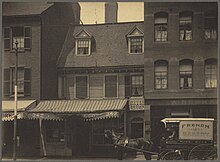Andrew Eliot
Andrew Eliot (1718 – 1778) was a prominent Boston Congregational minister of the New North Church (now St. Stephen's in Boston's North End).[1] He graduated from Harvard University in 1737 and received his masters in 1740. During the Siege of Boston in the American Revolutionary War, he was one of the few ministers to remain in Boston.[2]

In 1768, Eliot was elected to the American Philosophical Society.[3]
Eliot's father, grandfather and great-grandfather were all named Andrew. He had five sons: Reverend Andrew Eliot was a minister in Fairfield, Connecticut, Josiah Eliot was said to have gone to Georgia, Samuel Eliot was a merchant and the grandfather of Reverend William Greenleaf Eliot, Reverend John Eliot succeeded his father as pastor of New North Church and was one of the co-founders of the Massachusetts Historical Society and Dr. Ephraim Eliot studied medicine at Harvard University but became an apothecary and the first president of the Massachusetts College of Pharmacy.
Eliot had an extensive collection of New England silver coins.[4]
See also
[edit]References
[edit]- ^ "Oasis document". Archived from the original on 2012-05-15. Retrieved 2011-12-09.
- ^ Bernard Bailyn, Personalities & Themes in the Struggle for American Independence (New York: Random House, 1992)
- ^ "APS Member History". search.amphilsoc.org. Retrieved 2024-05-07.
- ^ Bowers, Q. David (2014). Coins & Collectors. p. 277.
External links
[edit]- Eliot, Walter Graeme (1887). A Sketch of the Eliot Family. New York: Press of Livingston Middleditch.
